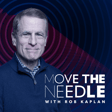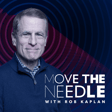
Doug Parker
This is Move The Needle with Rob Kaplan, where we talk to people who lead, innovate and inspire. What's it like to have taken over a major American airline just ten days before 9/11? Today on Move The Needle, Rob talks to Doug Parker, a longtime airline leader, about that and how the industry changed after that.
Doug Parker retired as CEO of American Airlines in March 2022 after more than 35 years in the airline industry, including 20 years as CEO. He was named CEO of American following the merger of American and US Airways in 2013. Doug continues to serve as chairman of American’s board of directors.
Doug remains a strong supporter of the people of the airline industry and American is emblematic of the transformation that has occurred in the industry in recent years. The integration of American and US Airways was a success and the airline made unprecedented investments in its team members and product while returning money to shareholders. Doug’s leadership during the COVID-19 pandemic helped stabilize the industry during an unprecedented decline in demand for air travel.
Previously, Doug was Chairman and CEO of US Airways. Under his leadership, the airline achieved record revenue growth, operational performance and profit margins that outpaced most industry peers. Doug served as Chairman, President and CEO of America West Airlines prior to the merger of US Airways and America West in 2005. He became CEO of America West 10 days before Sept. 11, 2001 and led the carrier through the crisis.
Doug’s experience prior to joining America West in 1995 includes four years with Northwest Airlines as Vice President, Assistant Treasurer and Vice President of Financial Planning and Analysis. From 1986 to 1991, he held several financial management positions with American.
Doug received the Distinguished Achievement Award from the Wings Club Foundation and the Legend in Leadership Award from the Yale Chief Executive Leadership Institute, in recognition of his extraordinary career. He is a member of the Vanderbilt University Board of Trust, the SMU Cox School of Business Executive Board, the Medal of Honor Museum Foundation Board of Directors and the International Air Transport Association Board of Governors.
Doug earned a bachelor’s degree in economics from Albion College in 1984 and an MBA from Vanderbilt University in 1986. He married his wife, Gwen, in 1990 and they have three children: Jackson, Luke and Eliza.
#movetheneedlewithdougparker #americanairlines #aviation #leadersinaviation #911 #USairways #airtravel #financialmanagement #ceo #northwestairlines #dougparker #vanderbilt #albioncollege #americawest #COVID19 #movetheneedlewithrobkaplan #samzeff #robkaplan #scottrichardson #ronelgolden

